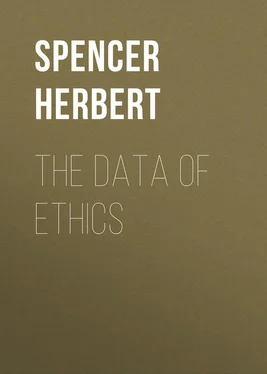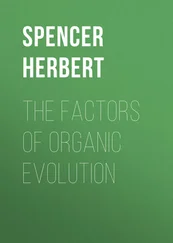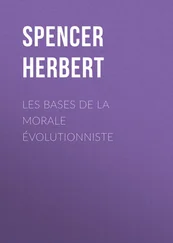Herbert Spencer - The Data of Ethics
Здесь есть возможность читать онлайн «Herbert Spencer - The Data of Ethics» — ознакомительный отрывок электронной книги совершенно бесплатно, а после прочтения отрывка купить полную версию. В некоторых случаях можно слушать аудио, скачать через торрент в формате fb2 и присутствует краткое содержание. Жанр: Философия, foreign_antique, foreign_prose, на английском языке. Описание произведения, (предисловие) а так же отзывы посетителей доступны на портале библиотеки ЛибКат.
- Название:The Data of Ethics
- Автор:
- Жанр:
- Год:неизвестен
- ISBN:нет данных
- Рейтинг книги:4 / 5. Голосов: 1
-
Избранное:Добавить в избранное
- Отзывы:
-
Ваша оценка:
- 80
- 1
- 2
- 3
- 4
- 5
The Data of Ethics: краткое содержание, описание и аннотация
Предлагаем к чтению аннотацию, описание, краткое содержание или предисловие (зависит от того, что написал сам автор книги «The Data of Ethics»). Если вы не нашли необходимую информацию о книге — напишите в комментариях, мы постараемся отыскать её.
The Data of Ethics — читать онлайн ознакомительный отрывок
Ниже представлен текст книги, разбитый по страницам. Система сохранения места последней прочитанной страницы, позволяет с удобством читать онлайн бесплатно книгу «The Data of Ethics», без необходимости каждый раз заново искать на чём Вы остановились. Поставьте закладку, и сможете в любой момент перейти на страницу, на которой закончили чтение.
Интервал:
Закладка:
This assumption, when examined, proves to be suicidal. If there are no other origins for right and wrong than this enunciated or intuited divine will, then, as alleged, were there no knowledge of the divine will, the acts now known as wrong would not be known as wrong. But if men did not know such acts to be wrong because contrary to the divine will, and so, in committing them, did not offend by disobedience; and, if they could not otherwise know them to be wrong, then they might commit them indifferently with the acts now classed as right: the results, practically considered, would be the same. In so far as secular matters are concerned, there would be no difference between the two; for to say that in the affairs of life any evils would arise from continuing to do the acts called wrong, and ceasing to do the acts called right, is to say that these produce in themselves certain mischievous consequences and certain beneficial consequences; which is to say there is another source for moral rules than the revealed or inferred divine will: they may be established by induction from these observed consequences.
From this implication I see no escape. It must be either admitted or denied that the acts called good and the acts called bad, naturally conduce, the one to human well-being and the other to human ill-being. Is it admitted? Then the admission amounts to an assertion that the conduciveness is shown by experience; and this involves abandonment of the doctrine that there is no origin for morals apart from divine injunctions. Is it denied that acts classed as good and bad differ in their effect? Then it is tacitly affirmed that human affairs would go on just as well in ignorance of the distinction; and the alleged need for commandments from God disappears.
And here we see how entirely wanting is the conception of cause. This notion that such and such actions are made respectively good and bad simply by divine injunction, is tantamount to the notion that such and such actions have not in the nature of things such and such kinds of effects. If there is not an unconsciousness of causation there is an ignoring of it.
§ 19. Following Plato and Aristotle, who make State enactments the sources of right and wrong; and following Hobbes, who holds that there can be neither justice nor injustice till a regularly constituted coercive power exists to issue and enforce commands; not a few modern thinkers hold that there is no other origin for good and bad in conduct than law. And this implies the belief that moral obligation originates with acts of parliament, and can be changed this way or that way by majorities. They ridicule the idea that men have any natural rights, and allege that rights are wholly results of convention: the necessary implication being that duties are so too. Before considering whether this theory coheres with outside truths, let us observe how far it is coherent within itself.
In pursuance of his argument that rights and duties originate with established social arrangements, Hobbes says:
"Where no covenant hath proceeded, there hath no right been transferred, and every man has a right to everything; and consequently, no action can be unjust. But when a covenant is made, then to break it is unjust ; and the definitions of injustice is no other than the not performance of covenant . And whatsoever is not unjust, is just . Therefore, before the names of just and unjust can have place, there must be some coercive power to compel men equally to the performance of their covenants, by the terror of some punishment greater than the benefit they expect by the breach of their covenant." 1 1 Leviathan , ch. xv.
In this paragraph the essential propositions are: justice is fulfillment of covenant; fulfillment of covenant implies a power of enforcing it: "just and unjust can have no place" unless men are compelled to perform their covenants. But this is to say that men cannot perform their covenants without compulsion. Grant that justice is performance of covenant. Now suppose it to be performed voluntarily: there is justice. In such case, however, there is justice in the absence of coercion; which is contrary to the hypothesis. The only conceivable rejoinder is an absurd one – voluntary performance of covenant is impossible. Assert this, and the doctrine that right and wrong come into existence with the establishment of sovereignty is defensible. Decline to assert it, and the doctrine vanishes.
From inner incongruities pass now to outer ones. The justification for his doctrine of absolute civil authority as the source of rules of conduct, Hobbes seeks in the miseries entailed by the chronic war between man and man which must exist in the absence of society; holding that under any kind of government a better life is possible than in the state of nature. Now whether we accept the gratuitous and baseless theory that men surrendered their liberties to a sovereign power of some kind, with a view to the promised increase of satisfactions; or whether we accept the rational theory, inductively based, that a state of political subordination gradually became established through experience of the increased satisfactions derived under it; it equally remains obvious that the acts of the sovereign power have no other warrant than their subservience to the purpose for which it came into existence. The necessities which initiate government, themselves prescribe the actions of government. If its actions do not respond to the necessities, they are unwarranted. The authority of law is, then, by the hypothesis, derived; and can never transcend the authority of that from which it is derived. If general good, or welfare, or utility, is the supreme end, and if State enactments are justified as means to this supreme end, then, State enactments have such authority only as arises from conduciveness to this supreme end. When they are right, it is only because the original authority endorses them; and they are wrong if they do not bear its endorsement. That is to say, conduct cannot be made good or bad by law; but its goodness or badness is to the last determined by its effects as naturally furthering, or not furthering, the lives of citizens.
Still more when considered in the concrete, than when considered in the abstract, do the views of Hobbes and his disciples prove to be inconsistent. Joining in the general belief that without such security for life as enables men to go fearlessly about their business, there can be neither happiness nor prosperity, individual or general, they agree that measures for preventing murder, manslaughter, assault, etc., are requisite; and they advocate this or that penal system as furnishing the best deterrents: so arguing, both in respect of the evils and the remedies, that such and such causes will, by the nature of things, produce such and such effects. They recognize as inferable à priori , the truth that men will not lay by property unless they can count with great probability on reaping advantages from it; that consequently where robbery is unchecked, or where a rapacious ruler appropriates whatever earnings his subjects do not effectually hide, production will scarcely exceed immediate consumption; and that necessarily there will be none of that accumulation of capital required for social development, with all its aids to welfare. In neither case, however, do they perceive that they are tacitly asserting the need for certain restraints on conduct as deducible from the necessary conditions to complete life in the social state; and are so making the authority of law derivative and not original.
If it be said by any belonging to this school that certain moral obligations, to be distinguished as cardinal, must be admitted to have a basis deeper than legislation, and that it is for legislation not to create but merely to enforce them – if, I say, admitting this, they go on to allege a legislative origin for minor claims and duties; then we have the implication that whereas some kinds of conduct do, in the nature of things, tend to work out certain kinds of results, other kinds of conduct do not, in the nature of things, tend to work out certain kinds of results. While of these acts the naturally good or bad consequences must be allowed, it may be denied of those acts that they have naturally good or bad consequences. Only after asserting this can it be consistently asserted that acts of the last class are made right or wrong by law. For if such acts have any intrinsic tendencies to produce beneficial or mischievous effects, then these intrinsic tendencies furnish the warrant for legislative requirements or interdicts; and to say that the requirements or interdicts make them right or wrong is to say that they have no intrinsic tendencies to produce beneficial or mischievous effects.
Читать дальшеИнтервал:
Закладка:
Похожие книги на «The Data of Ethics»
Представляем Вашему вниманию похожие книги на «The Data of Ethics» списком для выбора. Мы отобрали схожую по названию и смыслу литературу в надежде предоставить читателям больше вариантов отыскать новые, интересные, ещё непрочитанные произведения.
Обсуждение, отзывы о книге «The Data of Ethics» и просто собственные мнения читателей. Оставьте ваши комментарии, напишите, что Вы думаете о произведении, его смысле или главных героях. Укажите что конкретно понравилось, а что нет, и почему Вы так считаете.












